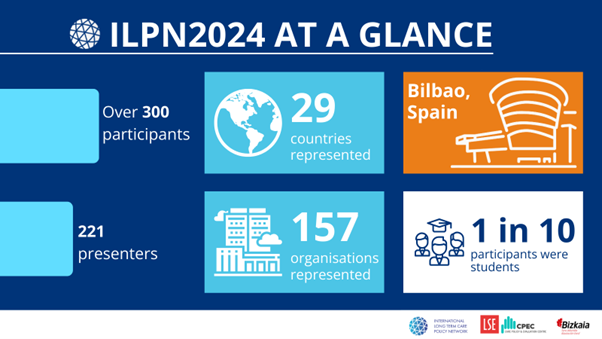By José Luis Fernandez, Director of ILPN and the Care Policy and Evaluation Centre (CPEC), based at the London School of Economics and Political Science (LSE)
The 7th International Conference on Evidence-based Policy in Long-Term Care, which took place from 12 to 14 September 2024 in Bilbao, marked a significant milestone for the International Long-term care Policy Network (ILPN) community and its dedication to long-term care (LTC). Hosting over 300 participants from 29 countries, the event was a testament to the continued growth of the LTC policy community. I was proud to witness how this network has evolved over the years, creating a positive, invigorating, and inspiring space for collaboration, dialogue, and innovation in LTC policy.
In partnership with the Bizkaia government
A significant factor in the success of the ILPN 2024 conference was the fantastic support we received from the Bizkaia government, spearheaded by the hyper-dynamic Naiara Artaza and her colleagues. Their generous assistance and enthusiastic involvement were crucial to the event’s success. From providing venues to ensuring smooth logistical operations, the Bizkaia government’s contributions helped create an atmosphere where participants could focus on the discussions and collaborations at hand. The conference was opened by Imanol Pradales, President of the Basque Government, and Elixabete Etxanobe Landajuela, President of the Government of Bizkaia, who reflected on how global learnings and connections strengthen local systems.
The local government’s commitment to supporting international dialogues on LTC not only highlights the region’s dedication to improving care systems but also sets a strong example of how local authorities can play an active role in facilitating global discussions on critical issues. On behalf of the entire ILPN community, I am immensely grateful for the Bizkaia government’s support, without which the conference would not have been possible.
Bringing together a diverse community
This year’s conference was not only a testament to the ILPN community’s intellectual and professional development, but also a reflection of the importance of global cooperation in tackling shared challenges in long-term care. The level of active participation was fantastic, with 221 individuals contributing as speakers. There were eight parallel sessions over the three days, each with its own array of topics for participants to explore – from cost projections of LTC, to unpaid care, dementia research, and country-specific roundtables. Participants were associated with 157 different organisations, representing a wide range of sectors, including academic institutions, public organizations, non-profits, and leading intergovernmental institutions. The geographical diversity of the conference was also remarkable, with contributors from countries across Europe, Asia, Africa, and the Americas making this a truly global event. The plenary sessions exemplified this diversity, with Stefania Ilinca from the WHO Regional Office for Europe reflecting on ageing in Europe, while Prof Norma Coe from the University of Pennsylvania shared insights from the US, and Joseba Zalakain emphasised the importance of comparative analysis and its potential contribution to shaping regional and national policies.
A key strength of the ILPN 2024 conference was the balance and diversity of its participants. Whereas most participants came from academia, we had a significant participation from public, non-profit, and voluntary sectors. Almost one in ten participants were students, bringing fresh, future-oriented ideas to the table. This strong representation was particularly refreshing, and reaffirmed the importance of passing the baton to the next generation of researchers, practitioners, and policy leaders. What started as a relatively small network has now become a positive, dynamic, and collaborative global community of experts. This engagement underlines the commitment of experts across the world to come together and share insights, solutions, and forward-thinking strategies aimed at improving long-term care systems.
The conference offered ample opportunities for networking and social interaction. The Reception at the Palacio Foral on 13 September, including an exciting display of local dancing folklore was particularly well-received by participants, and a word of support from Amaia Antxustegi, the Bizkaia Provincial Council’s Deputy for Social Policy. A key objective of ILPN is to allow participants to connect on a more personal level, strengthen the bonds within the ILPN community and foster new partnerships and collaborations. It was so rewarding to see participants from different sectors and regions engage in thoughtful, meaningful conversations, many of which I am sure will likely continue long after the conference.
Towards a future of collaboration
As we look to the future, I am already excited about what lies ahead for the ILPN. The discussions and collaborations that took place during the 2024 conference in Bilbao are bound to motivate a broader movement to transform long-term care globally. Looking forward to the ILPN 2026 conference, I am filled with optimism that it will build on the momentum we have generated, expanding our network, and deepening our collective understanding of the challenges and opportunities facing long-term care systems worldwide. We are also excited to host the new Global Observatory of Long-Term Care (GOLTC), which connects experts and showcases the latest LTC research via webinars and other outputs. I am of course biased, but it seems to me that the ILPN community has become an inspiring, and innovative force in the global LTC landscape, and I am honoured to be a part of it. I look forward to seeing what new insights, connections, and collaborations will emerge as we continue to work together toward a brighter future for long-term care.
To keep up to date with the latest ILPN activities, follow us on LinkedIn or X.


